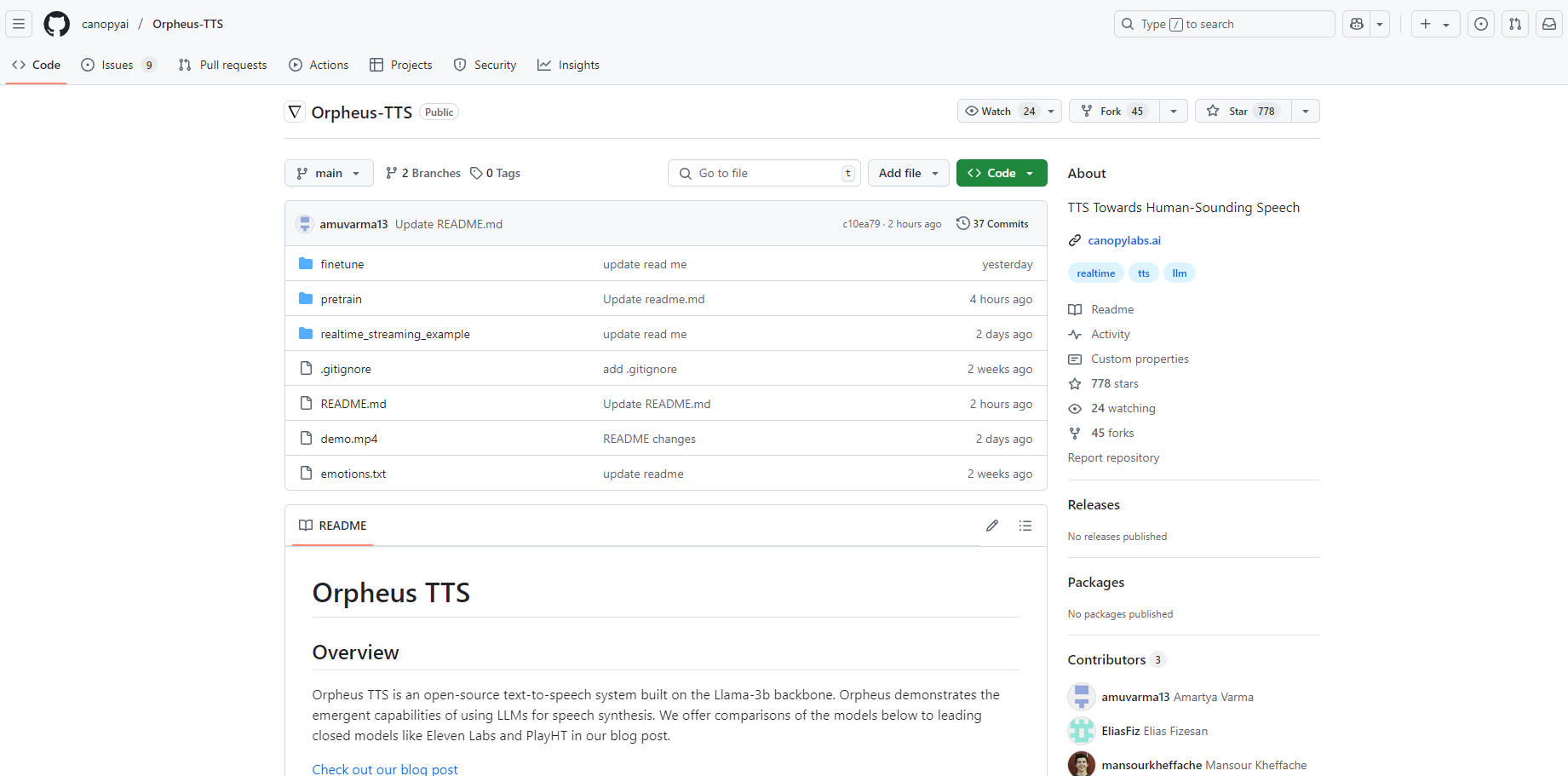
What is Orpheus TTS?
Orpheus TTS is a new, open-source text-to-speech system that leverages the power of Large Language Models (LLMs) to generate remarkably human-like speech. Built on the Llama-3b foundation, Orpheus delivers natural intonation, emotion, and rhythm, rivaling and even surpassing leading closed-source alternatives like Eleven Labs and PlayHT. It solves the problem of needing high-quality, customizable, and accessible TTS – without the restrictions of proprietary systems. You gain control, flexibility, and transparency, all while achieving state-of-the-art results.
Key Features:
🗣️ Generate Human-Like Speech: Orpheus produces speech with natural intonation, emotional expression, and rhythm, exceeding the quality of many closed-source models. This is achieved through extensive pretraining on a massive dataset and fine-tuning techniques.
🗣️ Perform Zero-Shot Voice Cloning: Clone voices realistically without any prior fine-tuning. Simply provide a sample, and the pretrained model can mimic the voice's characteristics. (More speech-text pairs in the prompt lead to better cloning with the pretrained model.)
🗣️ Guide Emotion and Intonation: Control the emotional tone and delivery of the generated speech using simple text tags (e.g.,
<laugh>,<sigh>,<crying>). Fine-tune the model to achieve nuanced and specific vocal styles.🗣️ Achieve Low-Latency Streaming: Experience real-time speech generation with a streaming latency of approximately 200ms. This is ideal for interactive applications, and can be further reduced to ~100ms with input streaming.
🛠️ Utilize Pretrained and Fine-tuned Models: Access both a general-purpose, pre-trained model (trained on 100k+ hours of English speech) and a fine-tuned model optimized for everyday TTS applications.
🛠️ Customize and Fine-Tune: Easily adapt Orpheus to your specific needs. We provide the data processing scripts and sample datasets, making it straightforward to create your own fine-tuned models. The process is similar to tuning an LLM with
TrainerandTransformers.🛠️ Integrate Easily: Use simple Python package (
orpheus-speech) for quick setup and integration. LeveragevLLMunder the hood for optimized, fast inference.
Use Cases:
Real-time Conversational AI: Imagine building a customer service chatbot that not only understands natural language but also responds with a voice that sounds genuinely empathetic and engaging. Orpheus's low-latency streaming makes this possible, creating a more human-like interaction.
Accessibility Applications: Develop assistive technology solutions for individuals with visual impairments or reading difficulties. Orpheus can convert written content into high-quality, natural-sounding speech, improving access to information and communication.
Content Creation and Dubbing: Create audiobooks, podcasts, or video voiceovers with diverse and expressive voices. Orpheus's zero-shot voice cloning and emotion control allow for rapid prototyping and customization, streamlining the content creation process.
Technical Details:
Architecture: Orpheus uses the Llama-3b architecture as its backbone. The pretrained model was trained on over 100,000 hours of English speech data and billions of text tokens, ensuring a strong understanding of language and nuanced speech patterns.
Model Sizes: Orpheus is available in four sizes: Medium (3B parameters), Small (1B parameters), Tiny (400M parameters), and Nano (150M parameters), providing options for different performance and resource requirements.
Tokenization: Orpheus employs a non-streaming CNN-based tokenizer. A sliding window modification to the detokenizer enables streaming without audio artifacts ("popping").
Decoding: The model flattens tokens sampled at different frequencies and decodes them as a single sequence, improving generation speed.
FAQ:
Q: How does Orpheus compare to other TTS systems?
A: Orpheus demonstrates comparable or superior performance to leading closed-source models like Eleven Labs and PlayHT in terms of naturalness, intonation, and emotional expression. Refer to the comparisons in our blog post.
Q: What hardware do I need to run Orpheus?
A: Orpheus can run efficiently on GPUs, with the 3 billion parameter model achieving real-time streaming on an A100 40GB GPU. Smaller models can run on less powerful hardware.
Q: How do I fine-tune Orpheus on my own data?
A: We provide detailed instructions and scripts for fine-tuning. The process is analogous to tuning an LLM using
TrainerandTransformers. You'll need a dataset in the specified Hugging Face format. High-quality results can be seen after ~50 examples, but 300 examples/speaker is recommended for best results.Q: How do I format prompts for the fine-tuned model?
A: For the
finetune-prodmodels, format your prompt as{name}: I went to the.... Valid names include "tara," "leah," "jess," "leo," "dan," "mia," "zac," and "zoe." Our Python package handles this formatting automatically. You can also add emotive tags like<laugh>or<sigh>.
Conclusion:
Orpheus TTS offers a powerful and flexible solution for anyone needing high-quality, customizable text-to-speech. Its open-source nature, combined with its advanced capabilities and ease of use, makes it a compelling alternative to proprietary systems. You gain control, transparency, and the ability to tailor the system to your specific needs, all while achieving state-of-the-art results.






